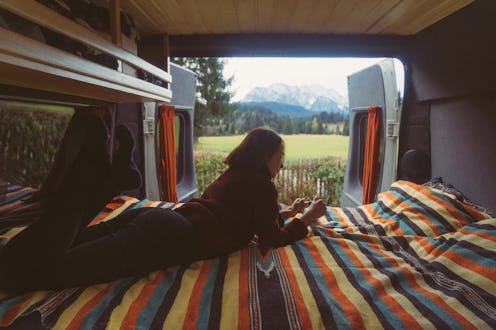Life
#Vanlife Hit Peak Popularity During COVID. Why?

For an increasing number of people, outfitting a cargo van or skoolie with a bed and kitchenette is not a campy novelty, but a place to call home. While #vanlife has been trending on Instagram (7.3 million posts) and YouTube (thousands of videos) for years, and more recently on TikTok (over a billion views), Google Trends shows the search term "van life" hit an all-time high on June 21. Terms like "absolute freedom" and "boundless exploration" and "ecological minimalism" are used to describe this lifestyle by van lifers, typically in captions of photos and videos that have thousands of likes. But people are not just double-tapping the voyeuristic fantasy of swapping rent for the road — they're actually doing it. Why now?
While most habitable vans and busses have accommodations like toilets, showers, and cooktops built-in, it's hard to rely entirely on this type of home without also external resources like gas stations, service shops, laundromats, grocery stores, and camping grounds. In the time of COVID, many of these resources are either closed, offering reduced services, or pose a high risk of exposure. At the same time, it seems this alternative lifestyle might provide the perfect loophole to "stay at home" and explore the world at the same time.
"Does it feel like a good time to be testing out alternative living? Yes and no," Alexa and Kyle, @endlesslyroaming on Instagram, tell Bustle. The pair swapped a row house in Baltimore for a short bus in October. "One of the constants when living on the road is unpredictability. Even if you plan meticulously, things go wrong and plans tend to change. With this being said, COVID was just another one of those unpredictable events."
Adam and Brittani, @fenimoresadventuremore on Instagram, ditched their apartment in Denver, sold all of their belongings, and hit the road in a red van named Clifford in February. Pandemic-related closures complicated their travels, but they didn't mind. "We ended up staying in Florida for nine weeks when originally we had planned on being there about two weeks. Plans change constantly, but we still love getting to live this way despite the new and unexpected challenges COVID has brought."
Outside of the U.S., van life was not just complicated but restricted in some areas. Luca, @lucafroehlingsdorf on Instagram, who left his childhood home in Stuttgart, Germany, in May of last year, had already been traveling around the Canary Islands in his van when COVID hit, and was forced by police restrictions to rent an apartment. "I wasn‘t allowed to stay in my van," he tells Bustle, adding that it was a "weird" and "expensive" time. "Especially because I‘ve felt more than safe alone in my van, than I did in the apartment," he adds.
While safety is always a concern for van lifers — sleeping in parking lots and leaving all of their belongings in a semi-secure place is a constant danger — health risks are a newer concern. "We do our best to limit our stops and be mindful of how frequently we are going grocery shopping, entering business, etc. We understand that each time we enter a community we need to do our part to keep ourselves and that community as safe as we can," Adam and Brittani explain. "It helps to be self-contained because we can head out deep into the wilderness by ourselves and enjoy nature while also being quarantined."
Though waking up with a different postcard view every morning is a shared value, van life isn't all Instagrammable vistas. "It is not luxurious, at all," Luca says. He wouldn't trade the freedom to "have a beach house one day and a mountain house the next," but he does miss using a toilet, showering regularly, and socializing. "I spend a lot of time alone," he says.
For Alexa and Kyle, the daily logistics make van life less glamorous than it looks online. "Finding where you can park overnight, where you can find drinking water, and where you can dump your waste aren’t check list items that you look forward to figuring out," they say. And for Adam and Brittani, it's the technical difficulties that make van life stressful. "It can be pretty nerve-wracking when things like engine trouble or close calls in a parking lot happen — our van is not just a vehicle, but our home," she says.
Though the timing of these adventures and current interest in the lifestyle might come with health risks and complications, Adam and Brittani say the trend makes sense. "A lot of people are considering this way of living right now due to canceled summer vacations (both domestic and international)," they say, adding that a van is the perfect antidote for travelers avoiding air travel. "The combination of many working remotely and craving some outdoor exploration is a perfect recipe for seeking out van life," they add.
As businesses and parks reopen in many states, the challenges are getting easier. And with what feels like a lot of grit and adaptability after learning to work around the pandemic, these van lifers are more committed to the lifestyle than ever. "It was always our vision to live in our van for at least a year. If anything, due to COVID we plan on doing this longer now," Adam and Brittani say. While Alexa and Kyle won't be taking the same journey they planned on, they're committed to life on the road for a while longer. "We’ve been limiting our time in cities and destination spots so that we feel safe, and in turn, ensuring the safety of others. But, with that being said, there are so many beautiful places to visit in nature that are just as rewarding so we never have a shortage of things to explore."